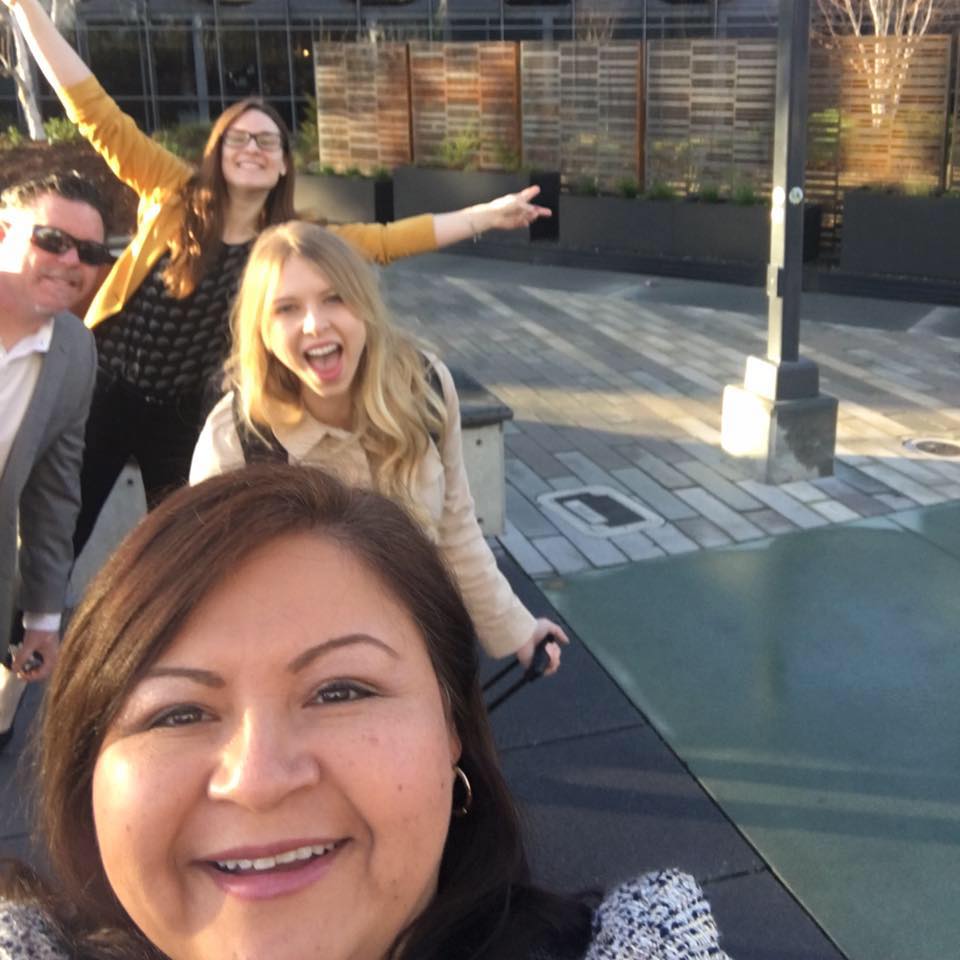Happy Google Day! Now here’s a stumper …
What do water, clean air, and YouTube have in common?
Gen Z can’t live without them.

Terrible joke. We know. But it’s true!
And it’s just one of the bazillion things we talked about on March 8th when Interact teamed up with ReachLocal, one of our key digital marketing partners, to host the first-ever Interact Google Day!
What Is Google Day? And Why Is It Awesome?
Seventy-eight marketing, communications, and educational professionals from community colleges across the country joined us at the famed Googleplex in Mountain View, California, for a deep dive into the inner workings of the world’s most popular search engine.
The best part? The cocktail party we hosted!
Ok. Just kidding. While the party was great, the coolest thing was really listening to the Google team offer their predictions for the future while sharing key community college marketing insights based on Google’s treasure trove of demographic data, search patterns, and analytics.
Here are a few of our favorite takeaways! Stay tuned for a follow-up post featuring more key insights from some of the clients who joined us!
Executive Director of Media Preferences Jamie Wagner on Students’ Media Preferences

Google was so much fun. The best takeaways I had were actually all the stats presented that reinforced what we’re seeing in Media Prefs! Some favorites were …
- Students use multiple touch-points to connect to their schools
- YouTube reaches more people than any broadcast or cable TV network (on mobile alone)
- Digital resources are mandatory for students in their decision-making processes
- More than half of all web traffic is coming from smartphones and tablets
- YouTube has 2 billion active users every month
Google Day According to Angela Carollo, Director of Communications

What shocked me was 90% of the data and content on Google comes from these past two years! This is amazing, especially when you consider Google was founded back in 1998. This also tells us that people are using Google for everything—maps, searching, news, images, videos, etc.
And with the development of Google Assistant and devices like Google Home, the data will continue to grow at exponential rate and become more and more ingrained in our lives. This puts Google in a great position to be the leader in predictive behavior, which, according to them, will be the next major technology revolution.
Thoughts from Alana Villemez, Senior Account Coordinator

I have to say that the biggest point I took away was that students are on a long educational journey with many touchpoints! Interact has a great enrollment pipeline that displays this, but it was fascinating to look at the journey from a digital marketing perspective.
According to Google, students are on a path like this:
Discovery → Consideration → Conversion → Retention.
We often talk about the enrollment pipeline as a way to figure out where students “fall through the cracks” in their journey, but we have to think about these as digital touchpoints too! Where are our students falling through the cracks online? Is your college easily found online, does your website highlight tell a story that students want to be a part of, do you use keywords to target your demographic, are you using pay-per-click ads to help students discover or make a decision, does your landing page intuitively direct the student to where they want to be and can they easily find what they need to know?
These are questions all community college marketers have to be asking. These students are long-term buyers and we have to be doing long-term marketing to reach and keep them.
Alejandra Navarro, Director of Communications, Weighs in on Google Day
In a recent Ad Week survey, half of the students said they “can’t live without YouTube.” Apparently, YouTube ranks up there with water, food and clean air! Although a bit dramatic, it just shows where students live their lives, where they socialize, where they learn how to do just about anything, and certainly, where they find a college program.
We know social media is a powerful influencer, but when you look at the data—the impressive figures—it’s clear just how powerful it is. Eighty-six percent of students said the most important resource in the college decision-making process is digital, according to a 2017 Google survey. That’s more than twice the next best influencer, which is admissions counselors (42 percent).
By now that number is likely much higher. And students expect digital to be fast—and accurate. One college had a 7-second loading time for its web page, which caused an estimated 26 percent visitor loss (3 seconds is optimal). Half of the businesses who have their online directories reviewed found that they had wrong information on their business listings.
If a student isn’t willing to spend 7 seconds waiting for a web page, are they willing to do multiple searches to find information about a college? Absolutely not! Most of us who market to students say we understand how influential digital is in the student journey. It’s time college administrators start understanding that so our marketing campaigns can reflect that!
Wrapping Up Our Awesome Google Day
Cool stuff, right?
Google’s education experts also introduced us to the idea of digital “micro-moments.” Micro-moments occur when people go to their smartphone or another digital device (which they due up to 150 times a day!) to learn something, do something, discover something, watch something, or buy something. They are intent-rich moments when decisions are made and preferences are shaped.
When our potential students are on their phones doing a search around our colleges, or programs, they want to find what they are looking for right away. This means the content we have waiting for them needs to be relevant and high in value.
The successful brands (and colleges!) of tomorrow will be those that have a strategy for understanding and meeting consumers’ needs in these micro-moments.

If you liked this post and are looking for more ways to improve your community college marketing skills, be sure to sign up for Interact’s monthly newsletter which features articles and podcasts on strategies and best practices related to boosting enrollments, improving student retention, branding your college, and much, much more!



